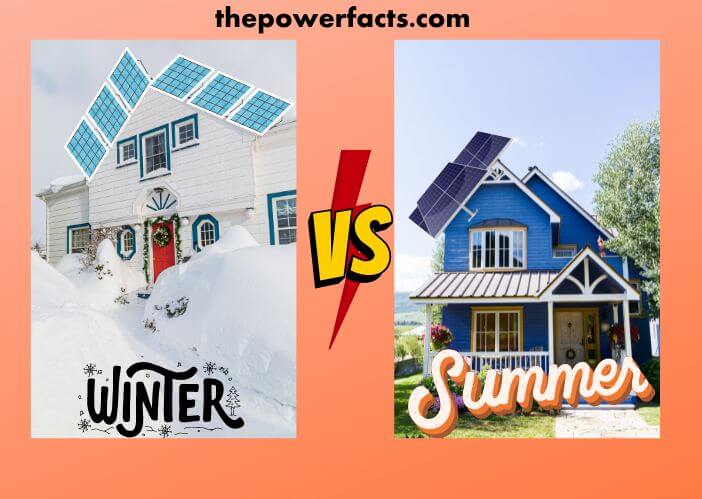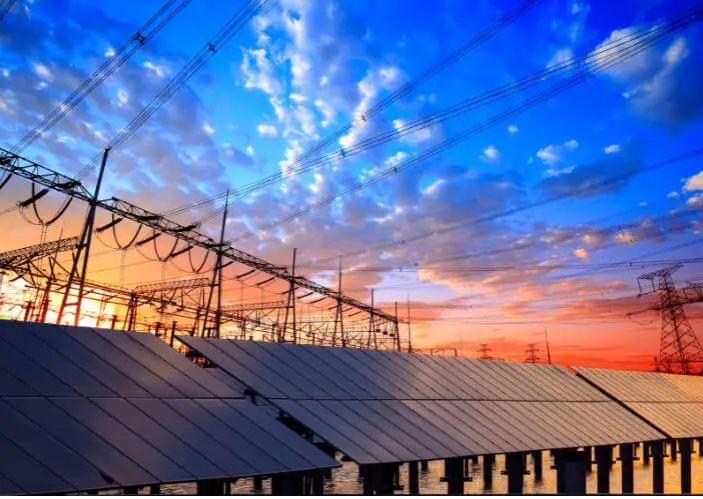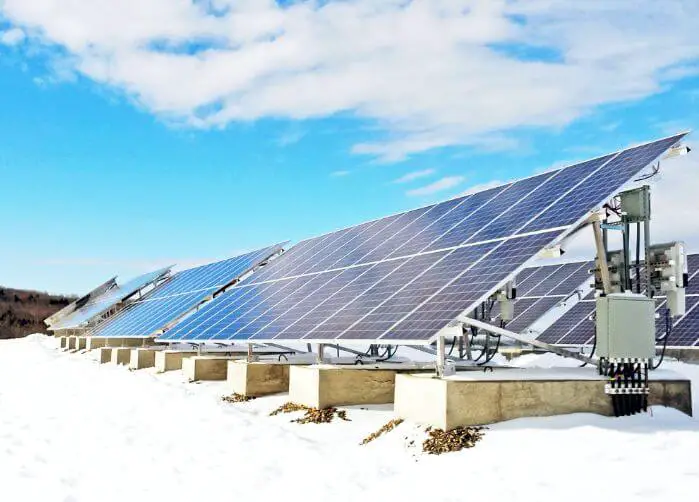There are many factors that affect solar panel output, but one of the most significant is the season. In winter, panels may produce less due to shorter days and lower sun angles, while in summer they may produce more due to longer days and higher sun angles. Factors such as cloud cover and temperature can also play a role.

The output of a solar panel is dependent on the amount of sunlight that it receives. In the winter, the sun is lower in the sky and the days are shorter, so there is less sunlight available for the panels to absorb. This results in lower output from the panels during the winter months.
In the summer, however, the sun is higher in the sky and there are more daylight hours, so solar panels receive more sunlight and have a higher output.
What are the Worst Months for Solar?
The worst months for solar are typically December, January, and February. This is because the sun is at its lowest point in the sky during these months, meaning that there is less sunlight available to power solar panels.
Additionally, weather conditions during these months can be unfavorable for solar production, with more cloudy days and shorter daylight hours. The amount of electricity produced by solar panels on cloudy days is lower than on sunny days, but it’s still enough to power your home or business.
Is Solar Power Stronger in Summer?
Most people believe that solar power is stronger in the summer months because the sun is out more often and shines brighter. However, this isn’t always the case. While it is true that solar panels will produce more electricity when the sun is shining directly on them, there are a few factors that can affect how much power they generate.
| The first factor | The first factor is the angle of the sun. In the summer, the sun is higher in the sky than in winter, which means that its rays hit solar panels at a more direct angle. This increased directness makes solar panels more efficient at converting sunlight into electricity. |
| Another factor | Another factor to consider is temperature. Solar panels work best when they’re cool, so hot summer days can actually reduce their efficiency. If your area gets a lot of sunshine but also has high temperatures, you might not see as much of an increase in power production during summer as you would if you lived in a cooler climate. |
| Finally | Finally, cloud cover can have an impact on how much power your solar panels produce. Obviously, if it’s cloudy outside then your panels won’t be getting as much sunlight and won’t generate as much electricity. However, even thin clouds can cause problems because they scatter sunlight and make it less direct. |
So if you live in an area with lots of summer thunderstorms or other types of cloud cover, you might not see as big of a difference in solar power output between the summer and winter months. Overall, while solar power typically is stronger in summer due to longer days and more direct sunlight, there are a few other factors that can affect how much electricity your panels produce during this time of year. Solar panels can charge without direct sunlight, but they are not as efficient as when they are in direct sunlight.

Are Solar Panels Efficient in the Winter?
Solar panels are not as efficient in the winter as they are in the summer. This is because the sun is not as strong in the winter, and the days are shorter. However, solar panels can still produce a lot of energy in the winter if they are placed in a sunny spot.
Do Solar Panels Produce Less in Hot Weather?
Yes, solar panels do produce less in hot weather. The main reason for this is that the heat makes the silicon inside the solar panel less efficient at converting sunlight into electricity. Additionally, the heat can cause the solar panel to expand and contract, which can lead to breakage over time.
How Much Does Rooftop Solar Power Production Vary Between Summer and Winter?
Solar Panel Output Vs Time of Day
Solar panels are a great way to produce Electricity from the sun. The output of a solar panel is determined by the amount of sunlight that hits the panel. The time of day also plays a role in how much electricity is produced by a solar panel.
In general, solar panels will produce more electricity during the daytime when the sun is out and shining brightly. However, there are other factors that can affect how much electricity is produced by a solar panel such as clouds, temperature, and the angle of the sun.
When Do Solar Panels Produce the Most Electricity?
Solar panels are most efficient at producing electricity when they are directly facing the sun. This means that the best time to generate power is during the daytime when the sun is highest in the sky. However, solar panels can also produce electricity on cloudy days and even during the night, though their output will be lower than on sunny days.
Solar Panel Production by Month
Solar panel production typically slows down during the winter months. This is due to a combination of factors, including shorter days and less sunlight. However, some manufacturers have found ways to continue producing solar panels year-round.
One such company is First Solar, which operates a solar panel factory in Ohio. The company has developed a process that allows it to produce solar panels even when there is little sunlight available.
First Solar’s process starts with thin sheets of cadmium telluride (CT) being cut into small squares.
These CT squares are then placed onto a glass sheet that has been coated with a conducting material.
The CT squares are heated until they melt, and then they are cooled quickly so that they solidify into an interconnected network of wires. This network of wires forms the basis for the solar cell.
Once the solar cell is formed, it is covered with a layer of protective material and then placed in an aluminum frame. The completed panel is then ready for installation on rooftops or in other locations where it will be exposed to sunlight.
Solar Production During Winter
If you live in a place with cold winters, you may think that solar production would drop off during this time. However, that’s not necessarily the case! Solar production can actually increase during the winter months, thanks to the reflection of sunlight off the snow.
Of course, this all depends on the weather conditions. If there is a lot of cloud cover, then solar production will be lower. But if the sun is out and there is fresh snow on the ground, your panels could see a boost in output.
So if you’re curious about how your solar panels will perform during winter, don’t hesitate to give them a try! You may be pleasantly surprised by the results.
Solar Generation in Winter
As the days grow shorter and the sun’s angle is lower in the sky, it would seem that solar power generation would become less efficient in winter. However, this is not always the case. In fact, solar panels can actually be more efficient when clean and in cold weather.
One reason for this is that solar panels are less likely to overheat in winter. When the temperature drops, panel efficiency increases because they operate at a cooler temperature. Additionally, there is typically more sunlight available during the winter months due to the reflection of snow-covered surfaces.
This means that even though the sun may not be as high in the sky, its light can still reach the panels quite effectively. Of course, there are some challenges to using solar power in winter as well. One is that panels must be kept free of snow and ice build-up in order to function properly.
Another issue is that batteries tend to lose their charge faster in colder temperatures, so backup power sources may be necessary on particularly cloudy or snowy days. Overall, though, solar power can still be a great option for generating electricity during the winter months – just be sure to take into account all of the potential challenges!

Solar Irradiance in Winter
As the days get shorter and the sun’s path is lower in the sky, solar irradiance (the amount of sunlight) reaching the Earth’s surface decreases. This can be a problem for solar power systems, which rely on sunlight to generate electricity. There are a few things that can be done to mitigate this issue.
| First | First, solar panels can be angled so that they capture more sunlight as the sun’s position changes throughout the year. |
| Second | Second, reflective surfaces can be used to bounce sunlight onto panels that would otherwise receive less direct light. |
| Finally | Finally, storage systems can be used to store solar energy generated during peak times for use during periods of reduced irradiance. |
Average Solar Panel Output Per Day
Solar panels are a great way to reduce your carbon footprint and save on energy costs. But how much power do they actually produce? The average solar panel produces about 1 kilowatt of power per day.
This may not seem like much, but it can add up over time. If you have a system of 10 panels, that’s 10 kilowatts of power per day! And if you have 100 panels, that’s 100 kilowatts of power per day.
Now, how much electricity does the average home use? According to the U.S. Energy Information Administration, the average home uses about 911 kilowatt-hours (kWh) of electricity per month. So, if you had a system of 10 panels, it would offset about 9% of your monthly electricity usage.
If you had 100 panels, it would offset about 91% of your monthly electricity usage! Of course, these are just averages and your actual output will vary depending on many factors such as the amount of sunlight you receive each day and the efficiency of your solar panels. Nevertheless, installing solar panels is a great way to reduce your carbon footprint and save money on your energy bill. You need an electrician to install your solar panels depending on a few factors.
Best Solar Panels for Winter Use
As the days grow shorter and the weather gets colder, you may be wondering if your solar panels will still work effectively in winter. The good news is that solar panels can actually produce more electricity in winter than in summer! Here are a few things to consider when choosing the best solar panels for winter use:
Panel Efficiency
Solar panel efficiency refers to how well a panel converts sunlight into electrical energy. The higher the efficiency, the more electricity the panel produces. When choosing solar panels for winter use, look for those with a high-efficiency rating so that you can maximize power output.
Temperature Tolerance
Some solar panels are designed to operate in extreme temperatures, while others may not perform as well in cold weather. If you live in an area with harsh winters, make sure to choose a panel that can withstand frigid temperatures. Solar panels are designed to withstand high wind speeds, but there is a limit to how much wind they can take.
Snow and Ice Build-up
In areas where snow and ice are common, it’s important to choose a solar panel that won’t be damaged by these conditions.
Look for panels with special coatings that protect against moisture and corrosion caused by ice and snow.
Wind Resistance
High winds can cause damage to unprotected solar panels. If you live in an area prone to strong winds, make sure to choose a panel that is rated for wind resistance.
Price
Obviously, price is always a factor when choosing any product – but it’s especially important when selecting solar panels since they are such a significant investment. Be sure to compare pricing from multiple vendors before making your final decision.
Conclusion
The output of a solar panel is determined by the amount of sunlight that hits the panel. In winter, the sun is lower in the sky and its light has to travel through more atmosphere, meaning less light reaches the solar panels. This results in a decrease in solar panel output during the winter months.
Additionally, snow and ice can accumulate on solar panels, further reducing their output. In summer, however, the sun is higher in the sky and there is less atmospheric interference, resulting in increased solar panel output.